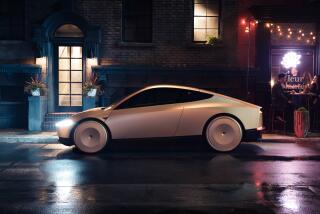Toyota steps up hydrogen fuel cell development
- Share via
Toyota is branching out beyond hybrids to ramp up its exploration of hydrogen fuel cell technology.
This week, three of the automaker’s reps head to Aspen, Colo., for the TED-esque Ideas Festival to “underscore Toyota’s commitment to fuel cell vehicles,” a spokeswoman said.
But don’t expect details of Toyota’s next venture into hydrogen, beyond confirmation that a production car planned for 2015 will be a sedan priced in the ballpark of $50,000.
“It’s going to be a significant premium to a Prius,” said Jaycie Chitwood, an alternative fuel manager for Toyota. “That doesn’t mean it can’t be cost competitive. It doesn’t need to be the same price if it’s less expensive to fuel in hydrogen.”
Fuel cell vehicles convert hydrogen and oxygen to electricity through a chemical reaction. They run on electric motors, but have potentially longer range than plug-in electric cars.
Toyota has spent the last few years working with the California Energy Commission and California Fuel Cell Partnership to troubleshoot the technology, hoping to make it an accessible alternative for drivers. “Of the options that we’ve evaluated, fuel cell is likely the most viable,” Chitwood said.
Toyota will premiere a concept version of the car this November at the Tokyo Auto Show. But two of the automakers’ fuel cell Highlander SUVs -- currently available only to research institutions and as security vehicles for the Port Authority of New York and New Jersey -- will make appearances in Colorado.
Hybrid technology remains at the core of Toyota’s green-car efforts, but the automaker makes a strong case for often-overlooked fuel cell technology. “It’s a no-compromise vehicle, versus a battery-electric vehicle that has limitations in terms of fueling time, driving range and vehicle size,” Chitwood said.
In sizing up potential buyers for the cars, Toyota has stumbled into familiar territory. The target demographic typically come from well educated households with incomes upward of $175,000, Chitwood said. They look, in fact, “very much like the first-generation Prius buyer,” Chitwood said. “They’re techies, they have a lot of money, and they’re willing to spend on a new technology.”
Shane Stephens-Romero, a senior scientist with the National Fuel Cell Research Center at UC Irvine, said the slow pace of green-car development forces automakers to look well into the future. Their market calculations are complicated by questions over future fueling infrastructure.
“Mass production requires a decision two or three years in advance,” Stephens-Romero said. “It’s not so much a technology hurdle as an aligning of the market in making that decision.”
PHOTOS: Top 10 cars with lowest sticker price per mpg
Stephens-Romero credited AB 118 for helping the state make progress. The law grants the California Energy Commission an annual budget of $100 million to develop and support alternative-fuel infrastructure. “But it would have been nice to be where we are now a year or two ago,” he said.
To date, nine refueling stations are available to the public in California, with another 19 in development. No automaker mass produces a fuel-cell car for the U.S. market, but Toyota, Honda, Hyundai, GM and Mercedes-Benz are exploring the technology.
Currently, hydrogen fuel cell buyers are not eligible for the $7,500 tax credit offered on electric car purchases. Such subsidies would be needed to reward early adopters of the technology, Chitwood said. That means first convincing policymakers that fuel cells are viable: “It’s not a fantasy. It’s not 20 years away. The cars are here, ready, now.”
ALSO:
State awards $18 million to build hydrogen fueling stations
U.S. trails in building infrastructure for hydrogen-powered cars
Fuel cell expert says Tesla is promising more than it can deliver
Twitter: @c_s_green






